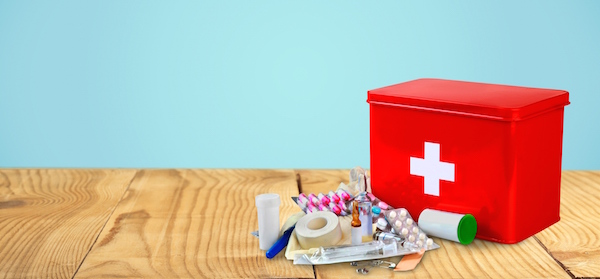It all culminates into busy chaos at this time of year: there are gifts to buy, things to organise and finish off, parties to attend, food to prepare – and that’s on top of all the everyday chores you need to do. So getting to the pharmacy or even making an appointment with your doctor can easily be overlooked. But fear not, as most minor health issues can be dealt with at home so long as you have the right meds.
Thus, we offer a handy list of medicines and first-aid paraphernaliato keep in your medicine cabinet, grouped conveniently by need, should such a situation arise during the festive period.
Aches and pains
A medicine cabinet cannot do without the obligatory paracetamol (e.g. Panadol, Panamax) and non-steroidal anti-inflammatory drugs (NSAIDs), such as Nurofen and Voltaren. These help with headaches, toothaches and muscle aches. You may even want some children’s formulations, especially if you will have littlies around.
For muscle aches, you can keep topical products, such as Tiger Balm, Voltaren gel and Deep Heat, to rub into those painful spots. If you prefer something more natural, something such as fisiocream, with arnica, will do the trick. A crepe bandage can also be useful.
Hangover cures
Okay, there’s no point sweeping this one under the carpet. It’s bound to happen more than once in December, and perhaps even in January.
You’ll want some paracetamol and a good-quality effervescent multivitamin tablet. Also, milk thistle, a complementary medicine, is a good liver cleanser, but is best taken before you go out on a bender.
You’ll need to drink plenty of water, too. But, of course, you don’t need to keep that in your medicine cabinet!
Sunburn, bites, stings and grazes
Aloe vera gels and creams can work a treat for sunburn, while local anaesthetics and paracetamol can give some pain relief.
For bites and stings, you’ll want to keep some antihistamines on hand in case of an allergic reaction. Talk to your pharmacist about the best options when stocking up. It’s also worthwhile keeping an anti-itch and healing/soothing preparation – such as bepanthen creams, calamine lotion, Pinetarsol andStingose. But if you’re ever in doubt of the seriousness of a bite or sting, always see your doctor or pharmacist.
For grazes, you’ll want some antiseptic wipes and creams, as well as different-sized sticking plasters and dressings. Your pharmacist can guide you.
Upset tummy
There’s a lot of eating and drinking over the festive season, which increases your risk of overeating or eating something a little ‘off’. So it never goes astray to keep oral rehydration preparations (e.g. Gastrolyte) in your cabinet.
Anti-diarrhoeal medicines (e.g. Lomotil) are not recommended because it’s best to let the infection run its course, but if you need to be out and about, they can be handy to ‘use when necessary’.
Hayfever, cold and flu
If you suffer from hayfever, make sure you have enough hayfever meds on hand – whether in the form of tablets, nasal sprays, liquids or eyedrops.
While colds and flus are unlikely at this time of year, they can still happen, especially if your immune system is run down from all that running around. Paracetamol can help with fever, while decongestants can give your sinuses some relief.
Prescription medicines
If you take prescription medicines, make sure you have enough over the holiday period so that you don’t run out. Especially if you’re going to be away from home. Nothing is more annoying than having to get a script filled when you are not in your hometown.
As with all medicines – whether OTC, prescription or complementary – always use them according to the label, and be wary of potential side effects and interactions with other medicines.
Now, go forth and enjoy your festivities with gusto, since you have the safety net of your own medicine cabinet.
Did we miss anything? What else do you keep in your trusty medicine cabinet?

